A veteran Marine officer in Congress described called Rep. Duncan Hunter, a major in the Marine Corps Reserve, reiterated on Monday that Navy Secretary Ray Mabus as "a bigger threat to the men and women of the Marine Corps than ISIS" for trying to integrate women into infantry and other combat arms positions military occupational specialties.
The acronym ISIS is an alternative name to the Islamic State group.
Rep. Duncan Hunter, R.-Calif., first told Politico on Friday Jan. 8 that he strongly opposed Mabus’ efforts to integrate male and female recruits at boot camp and to make job titles neutral.
Mabus' Jan. 1 memo to Marine Corps Commandant Gen. Robert Neller about removing the word "man" from position titles is "just stupid," Hunter told Marine Corps Times on Monday.
"None of the secretary of the Navy’s policies help us close with and destroy the enemy with fire and close combat," he said. Hunter told Marine Corps Times on Monday. "Mabus’ social meddling puts every Marine in harm’s way at greater risk."
Hunter, who served two combat tours in Iraq and a third in Afghanistan, took particular issue with Mabus' response to a nine-month Marine Corps infantry integration test, which determined mixed-gender teams were slower and did not shoot as well as all male teams. Women were also injured at twice the rate of male Marines.

Female Marine recruits complete an obstacle course at Marine Corps Recruit Depot Parris Island, S.C. The Navy secretary recently called on the Marine Corps to develop plans for coed recruit training.
Photo Credit: Marine Corps
A day after the Marine Corps released its findings on its infantry experiment, Mabus told National Public Radio that the integration test was flawed.
"It started out with a fairly large component of the men thinking 'this is not a good idea,' and 'women will never be able to do this,' " Mabus said in the September interview with told NPR’s David Greene on Sept. 11. "When you start out with that mindset, you're almost presupposing the outcome."
Mabus also said the Marine Corps could have selected female Marines who were strong enough to carry heavy loads, and that accounted for the high number of injuries among female Marines.

Navy Secretary Ray Mabus makes remarks during the Marine Corps passage of command ceremony held at Marine Barracks, in Washington, on Sept. 24.
Photo Credit: Joint Staff Public Affairs
On Monday, Hunter said Mabus' stance accused Mabus of putting "every Marine in harm’s way at greater risk" by makes Marines ing them less combat effective.
"According to the Marine Corps' own study on gender integration in ground combat units, Mabus' social meddling will get Marines killed," Hunter said.
He added that Mabus' Jan. 1 memo to Marine Corps Commandant Gen. Robert Neller about removing the word "man" from position titles is "just stupid."
Mabus declined to respond to Hunter's comments, according to his spokesman.
The issue of integrating female Marines into combat military occupational specialties MOSs has been particularly difficult for the Marine Corps, which was the lone service to ask Defense Secretary Ash Carter to keep some of those jobs closed to women while Gen. Joseph Dunford was commandant.
"I reviewed that information and I looked at it carefully," Carter said at a Dec. 3 Pentagon news conference. "I also heard from other leaders of other services who had studied similar issues in their own force, the recommendations of the other service secretaries and service chiefs, and I came to a different conclusion in respect of those specialties in the Marine Corps."
Dunford, now chairman of the Joint Chiefs of Staff, was notably absent from the news conference. When one reporter asked if Dunford is "fully on board" with his decision, Carter replied: "Well, you'll have to speak to him about that. But he understands what my decision is and my decision is my decision, and we will implement it accordingly.
However, it is clear that not everyone within the Marine Corps is convinced that integrating female Marines into combat positions is the right thing to do. On Jan. 8, Marine Gen. John Kelly told reporters Friday he is worried the military services will feel pressure in the future to lower the physical standards for women in combat MOSs.
"I think it will be the pressure for not probably the generals that are here now, but for the generals to come, and admirals, to lower standards because that's the only way it'll work in the way that I hear some people, particularly, the agenda-driven people here in Washington — or in the land, the way they want it to work," Kelly said at a Pentagon news briefing.
Unless the military changes the physical standards for women, it will be very hard for a significant number of women to join the infantry and special operations forces, according to Kelly, who is retiring as the head of U.S. Southern Command.
"The other aspect is, because of the nature of infantry combat, infantry training, and all of rest, there's a higher percentage of young women in the scientific study that get hurt, and some of them get hurt forever," he said.




